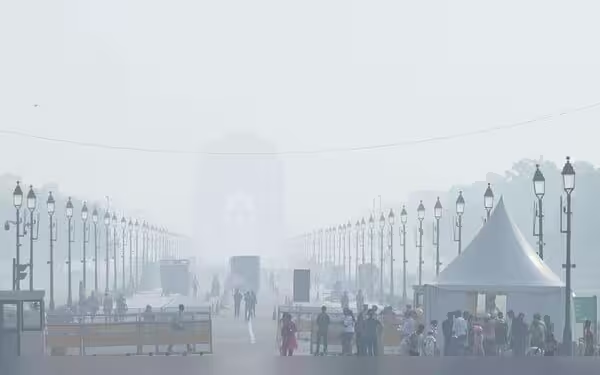Thursday, November 7, 2024 10:32 PM
Delhi AQI Stays 'Very Poor' Amid Toxic Smog Post-Diwali
- Delhi's AQI recorded at 339, improving from 362.
- Noise pollution spiked during Diwali celebrations.
- Residents advised to take precautions against smog.
 Image Credits: menafn
Image Credits: menafnDelhi's air quality remains 'very poor' post-Diwali, with AQI at 339. Residents face health risks amid toxic smog and rising noise pollution.
Delhi, the bustling capital of India, is no stranger to air pollution, especially during festive seasons. As the city woke up to a thick blanket of smog, the air quality index (AQI) remained in the "very poor" category. However, the situation did not worsen significantly after the Diwali celebrations, which is often marked by the bursting of firecrackers. This improvement can be attributed to a reduction in firecracker usage and favorable weather conditions.
On Friday, the 24-hour average AQI recorded at 4 p.m. was 339, a notable improvement from the 362 recorded at 9 a.m. the same day. This data, sourced from the Central Pollution Control Board (CPCB), indicates that while the air quality was still concerning, it did not reach the anticipated "severe" levels that many had feared due to the Diwali festivities. The Delhi Pollution Control Committee (DPCC) also reported an increase in noise pollution levels during the evening hours of Diwali, highlighting the dual challenge of pollution that the city faces.
Delhites experienced unusually warm weather on Friday, with the maximum temperature soaring to 33.6 degrees Celsius, which is three degrees above the normal range. The minimum temperature was recorded at 18.4 degrees Celsius, 2.3 degrees above normal. These above-normal temperatures, combined with favorable winds, played a crucial role in preventing a sharp decline in air quality. Despite these conditions, many areas in Delhi were still shrouded in a thick layer of smog, making it difficult for residents to breathe.
Areas such as JLN Stadium, GTB Nagar, and Surya Nagar were among the most polluted spots in Delhi-NCR on Saturday, November 2. This situation serves as a reminder of the ongoing battle against air pollution in urban areas, particularly during festive seasons when air quality tends to deteriorate.
As we reflect on the current air quality situation in Delhi, it is essential for residents to remain vigilant and take necessary precautions. Wearing masks, using air purifiers, and limiting outdoor activities during high pollution days can help mitigate health risks. Moreover, it is crucial for the government and citizens alike to work together in finding sustainable solutions to combat air pollution, ensuring a healthier environment for future generations.













